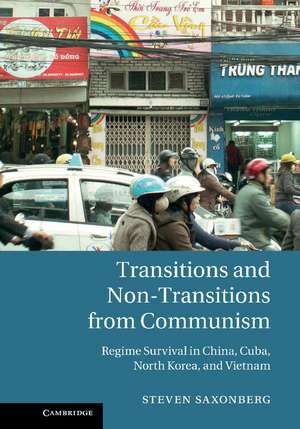Transitions and Non-Transitions from Communism: Regime Survival in China, Cuba, North Korea, and Vietnam
Autor Steven Saxonbergen Limba Engleză Hardback – 13 feb 2013
Preț: 794.45 lei
Preț vechi: 923.78 lei
-14% Nou
Puncte Express: 1192
Preț estimativ în valută:
152.01€ • 159.57$ • 126.18£
152.01€ • 159.57$ • 126.18£
Carte tipărită la comandă
Livrare economică 11-25 aprilie
Preluare comenzi: 021 569.72.76
Specificații
ISBN-13: 9781107023888
ISBN-10: 1107023882
Pagini: 364
Ilustrații: 2 b/w illus. 3 tables
Dimensiuni: 155 x 231 x 28 mm
Greutate: 0.66 kg
Ediția:New.
Editura: Cambridge University Press
Colecția Cambridge University Press
Locul publicării:New York, United States
ISBN-10: 1107023882
Pagini: 364
Ilustrații: 2 b/w illus. 3 tables
Dimensiuni: 155 x 231 x 28 mm
Greutate: 0.66 kg
Ediția:New.
Editura: Cambridge University Press
Colecția Cambridge University Press
Locul publicării:New York, United States
Cuprins
1. Introduction; 2. Communist regime types; 3. Nationalism and patrimonial communism; 4. Ideology and opposition to communism; 5. Revolutionary potential and revolutionary outcomes; 6. Transitions without revolutions; 7. Non-transitions among maturing countries; 8. Non-transition and patrimonial communism; 9. What next?
Recenzii
'Looking at the wide range of surviving and collapsed communist regimes to compare their strengths and weaknesses, this very well-researched, thoughtful book achieves what none other has yet done so clearly and knowledgeably. It explains what generally went wrong, why some such regimes have survived, and it also makes some predictive suggestions that are very useful because they apply to other dictatorial ideological cases. This is a very welcome major addition to social science theory as well as being empirically very interesting and thorough.' Daniel Chirot, Job and Gertrud Tamaki Professor of International Studies, University of Washington
'This is an innovative and insightful comparative study of transitions and non-transitions from communism. Steven Saxonberg analyses an impressive range of cases, in Europe, Latin America and Asia, to explore the factors that shape the attenuation and collapse of communist regimes as well as their adaptation and survival. He has especially interesting things to say about the effects of changes in political legitimacy on the development of regimes and opposition strategies.' Alex Pravda, University Lecturer in Russian and East European Politics, University of Oxford
'Whereas many scholars have written on and explained in detail why communist regimes in the Soviet Union and elsewhere fell, the issue of non-transitions is still widely unexplored and unexplained. This book fills an important gap and offers a unique perspective on cases of both transition and non-transition from communism. It is rich in empirical details and a must-read - not only for transitologists but even more for social scientists and area experts who analyze cases like Vietnam, China and Cuba and who wonder if, when and how spring might come.' Joerg Wischermann, Institute of Asian Studies and German Institute of Global and Area Studies (GIGA), Hamburg
'This interesting book examines a range of factors that lead to different types of regime collapse … regimes inspired in part by Marxism across the globe will benefit from reading this book … Recommended. Upper-division undergraduates and above.' M. D. Rothwell, Choice
'This is an innovative and insightful comparative study of transitions and non-transitions from communism. Steven Saxonberg analyses an impressive range of cases, in Europe, Latin America and Asia, to explore the factors that shape the attenuation and collapse of communist regimes as well as their adaptation and survival. He has especially interesting things to say about the effects of changes in political legitimacy on the development of regimes and opposition strategies.' Alex Pravda, University Lecturer in Russian and East European Politics, University of Oxford
'Whereas many scholars have written on and explained in detail why communist regimes in the Soviet Union and elsewhere fell, the issue of non-transitions is still widely unexplored and unexplained. This book fills an important gap and offers a unique perspective on cases of both transition and non-transition from communism. It is rich in empirical details and a must-read - not only for transitologists but even more for social scientists and area experts who analyze cases like Vietnam, China and Cuba and who wonder if, when and how spring might come.' Joerg Wischermann, Institute of Asian Studies and German Institute of Global and Area Studies (GIGA), Hamburg
'This interesting book examines a range of factors that lead to different types of regime collapse … regimes inspired in part by Marxism across the globe will benefit from reading this book … Recommended. Upper-division undergraduates and above.' M. D. Rothwell, Choice
Notă biografică
Descriere
A unique comparative study examining why some communist regimes remain in power, whilst others have fallen.
















